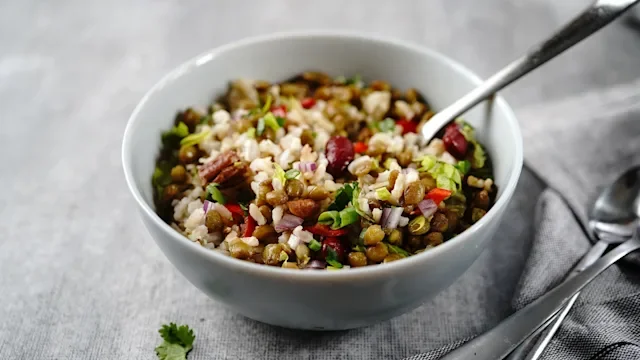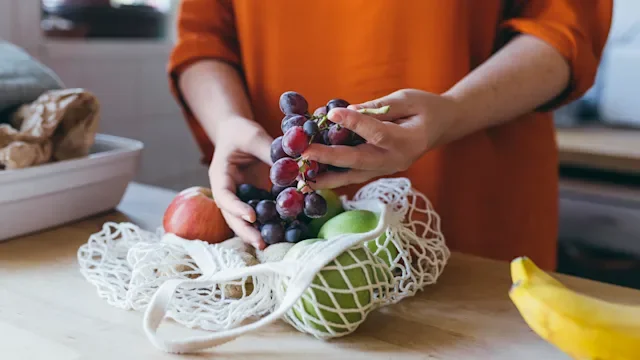Key takeaways:
While there is no diet specific for fertility, what you eat can play a role in your fertility and overall health.
Foods like whole grains, fruits, and unsaturated fat sources support fertility, while things like added sugar and refined carbohydrates may lower it.
While diet can help, it is not the only solution to fertility issues. It’s always best to talk with a healthcare provider if dealing with infertility or other related concerns.
Whether or not you are trying to conceive, your fertility matters.
Unfortunately, having lower fertility is common. It affects about 1 in 5 couples trying to conceive, and can affect both men and women.
The good news is that eating more fertility boosting foods may help improve your fertility health.
What diet works best for fertility?
Contrary to popular belief, there is no standard diet plan that is guaranteed to improve your fertility. In fact, following a strict diet can actually worsen your chances of getting pregnant. This is because dieting that involves severely restricting calories can affect your body fat and interfere with your hormones, particularly for women.
Hormones, such as estrogen and progesterone, are deeply involved in a woman’s ability to become pregnant. So if they are out of balance, fertility may be affected.
That said, what you eat still does play a role in how fertile your body is. Eating some foods might help boost your chances of getting pregnant, while others can have the opposite effect. Eating an overall healthy diet is likely to give you the best chance at boosting fertility.
Foods that can help with fertility
Both men and women can boost their fertility by focusing on the following six foods.
1. Whole grains
Whole grains are great sources of many important nutrients for fertility, including magnesium, zinc, and fiber. They also offer some types of antioxidants, which can help preserve fertility. The fiber found in whole grains helps stabilize blood sugar and prevent insulin resistance, which can affect fertility.
One study showed that women who ate more whole grains before undergoing in vitro fertilization (IVF) had a better chance of having a live birth than women who ate less.
Read more like this
Explore these related articles, suggested for readers like you.
Examples of whole grains include brown rice, quinoa, and whole-wheat products.
2. Fruit
Fruit is highly nutritious and offers nutrients like antioxidants, potassium, and fiber. One study done on women in the UK, Australia, and New Zealand reported that women took longer to become pregnant if they ate fruit less than 1 to 3 times a month compared to those who ate it more often.
The antioxidants in fruit can help protect against oxidative stress, which can cause damage to your cells. Having oxidative stress can harm fertility in both males and females. High amounts of antioxidants may improve sperm quality in men.
Examples of highly nutritious fruits include berries, oranges, and apples.
3. Vegetables
Vegetables, such as asparagus, broccoli, and carrots, provide a great source of many key nutrients, including folate and vitamins A and K. Most vegetables are also low in calories and provide important fiber. Fiber supports a healthy gut microbiome, which may have an effect on fertility.
Fiber also helps support a healthy glycemic response, which is how your body responds to consuming sugar. Eating foods that are high in dietary fiber, such as vegetables, can support fertility.
4. Foods high in unsaturated fats
Unsaturated fats are a healthy type of fat that may support fertility for both men and women. Examples of foods high in unsaturated fats include olive oil, avocados, nuts and seeds.
A large study found that women who ate the highest amounts of monounsaturated fats, along with other healthy foods before becoming pregnant, had a 66% lower risk of infertility related to ovulation disorders and a 27% lower risk of infertility due to other causes when compared to women who ate less of these foods.
5. Salmon
Fatty fish like salmon, tuna, and sardines are naturally rich in omega-3 fatty acids, which are a type of polyunsaturated fat. While it’s unclear whether omega-3 fatty acids promote fertility in the general population, some research suggests that fish, along with other staples of a Mediterranean diet, may help people going through IVF become pregnant. Also, it’s possible that foods rich in omega-3’s might improve sperm quality.
6. Beans and lentils
Beans and lentils provide a great source of plant-based protein. One small study showed that men who followed a vegan diet had a higher sperm count then men who did not follow a plant-based diet. Another research reports that eating more plant-based proteins had a positive effect on female fertility.
Each of these food groups are staple parts of the Mediterranean diet, which may positively influence lifelong fertility.
What foods should you limit if you’re trying to boost fertility?
Even so, some eating habits can affect your fertility. Research has reported that eating a lot of ultra-processed foods is associated with infertility and a moderate boost in the time that it takes to become pregnant.
Some foods that may lower fertility include:
Excess sugar: This includes foods high in added sugars, such as desserts, candy, and sweetened beverages. Sugar has a high glycemic index, meaning it raises your blood sugar fast and high. Eating too much sugar can lead to negative health outcomes like insulin resistance, high cholesterol, and oxidative stress, all of which affect fertility.
Other refined carbohydrates: Besides sugary foods, other sources of refined carbohydrates can also affect normal blood sugar levels and fertility. Examples of refined carbohydrates include products made with white flour, like breakfast cereals, pasta, and many snack foods.
Animal proteins in large or frequent amounts: Research has reported that consuming a lot of animal protein, specifically red and processed meats, may indirectly affect fertility by raising the risk of conditions that affect fertility, like Type 2 diabetes and PCOS.
Trans fats: These are the least healthy types of fat and linked to greater inflammation and may affect fertility. Even though the FDA required trans fats to be removed from the food supply, foods that contain less than 0.5 g per serving are still allowed to show 0 g of trans fats on their nutrition label. In other words, it is still very possible to consume them through fried foods, baked goods, and ultra-processed foods.
Do vitamins or supplements help with fertility?
While it is always best to try to get most of your nutrients from whole food sources, supplements can sometimes also help. Here are three supplements you can talk to a healthcare provider about:
Prenatal vitamin: A woman’s body needs higher amounts of nutrients to become and stay pregnant, especially folic acid. People who breastfeed should also continue to take a prenatal vitamin.
Omega-3 supplement: A recent study showed that omega-3 fatty acid supplements were associated with higher likelihood of pregnancy following IVF.
Vitamin E: Some experts recommend short term vitamin E supplements for male infertility.
When to see a doctor about diet and infertility
In some cases, changing your diet or lifestyle can make a significant impact on your fertility health and help prevent or treat infertility.
But, there can be many other causes of infertility as well that may or may not be able to be solved with diet alone. If you have been unable to become pregnant for 6 months or longer, have irregular periods, or have a history of medical conditions that affect fertility, talk with a healthcare provider. They can help run tests, do physical exams, and help you recommend a plan of action.
The bottom line
Your fertility health is important whether or not you want to have a child. While there is no exact diet that is best for fertility, changing what you eat may help improve your fertility health and benefit your whole body.

Why trust our experts?



References
Ahmadi, S., et al. (2016). Antioxidant supplements and semen parameters: An evidence based review. International Journal of Reproductive Biomedicine.
Alesi, S., et al. (2022). Anti-inflammatory diets in fertility: An evidence review. Nutrients.
Falsig, A., L., et al. (2019). The influence of omega-3 fatty acids on semen quality markers: a systematic PRISMA review. Andrology.
Gaskins, A.. J., et al. (2016). Maternal whole grain intake and outcomes of in vitro fertilization. Fertility and Sterility.
Grieger, J. A., et al. (2018). Pre-pregnancy fast food and fruit intake is associated with time to pregnancy. Human Reproduction.
Jouanne, M., et al. (2021). Nutrient requirements during pregnancy and lactation. Nutrients.
Kljajic, M., et al. (2021). Impact of the vegan diet on sperm quality and sperm oxidative stress values: A preliminary study. Journal of Human Reproductive Sciences.
Meczekalski, B., et al. (2014). Functional hypothalamic amenorrhea and its influence on women’s health. Journal of Endocrinological Investigation.
Panth, N., et al. (2018). The influence of diet on fertility and the implications for public health nutrition in the United States. Frontiers in Public Health.
Showell, M. G., et al. (2014). Antioxidants for male subfertility. The Cochrane Database of Systematic Reviews.
Skoracka, K., et al. (2021). Female fertility and the nutritional approach: The most essential aspects. Advances in Nutrition.
Smits, R. M., et al. (2018). Antioxidants in fertility: Impact on male and female reproductive outcomes. Fertility and Sterility.
Stanhiser, J., et al. (2022). Omega-3 fatty acid supplementation and fecundability. Human Reproduction.
U.S. Food and Drug Administration. (2018). Small entity compliance guide: Trans fatty acids in nutrition labeling, nutrient content claims, and health claims.
U.S. Food and Drug Administration. (2018). Trans fat.
Vujkovic, M., et al. (2010). The preconception Mediterranean dietary pattern in couples undergoing in vitro fertilization/intracytoplasmic sperm injection treatment increases the chance of pregnancy. Fertility and Sterility.


















